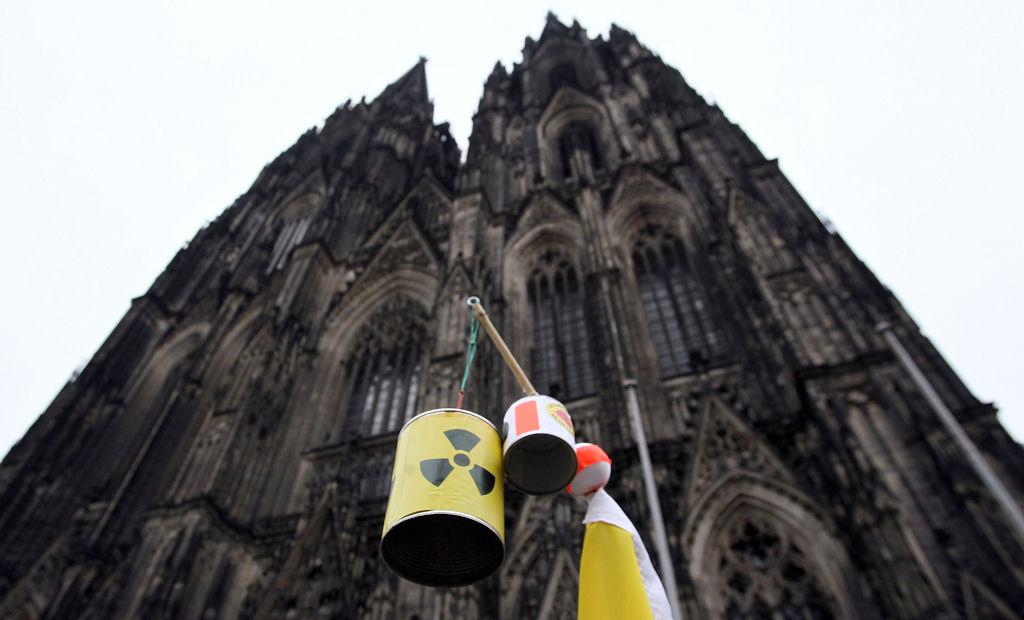Japan’s nuclear disaster deals a blow to Europe’s atomic energy industry
The Cologne cathedral and a sign referring to the nuclear disaster at the Fukushima facility in Japan during an anti-nuclear demonstration on March 14, 2011 in Cologne, Germany. Thousands of anti-nuclear demonstrators gathered in a coordinated effort in cities across Germany to protest against the government-granted extension of the operational lives of Germanys older nuclear power plants.
BERLIN, Germany — The possible meltdowns and other complications at Japanese nuclear power plants following an 8.9-magnitude earthquake have triggered an almost seismic reaction in nuclear-skeptic Germany.
Fear and mistrust of atomic power brought an estimated 100,000 people to the streets in hundreds of towns and cities across the country on Monday calling for an end to the country’s nuclear power program.
German Chancellor Angela Merkel, painfully aware of the public reaction to the unfolding Japanese disaster, announced today that the seven German nuclear power plants built before 1980 would be taken offline, at least for the three months already set aside for a comprehensive review of the entire industry.
But no matter Germany's decision on its own plants, it is surrounded in Europe by countries heavily reliant on nuclear power. Figures from Foratom, the trade association of the European nuclear industry, show Germany generates 26 percent of its electricity from nuclear sources, way behind France, which tops the European nuclear league with 58 nuclear power plants generating 75 percent of its electricity.
The United Kingdom is second with 19 plants, but they only produce 13 percent of the country’s electricity, while Sweden has 10 plants producing 37 percent of its power.
Of the 27 European Union countries, 15 have nuclear power plants, which generate 30 percent of the region’s electricity, said Christian Taillebois, Foratom’s external relations director.
Speaking from Brussels, he said that although national regulatory authorities were responsible for safety in each country, they took their basic standards from the International Atomic Energy Authority (IAEA), the global nuclear authority.
“The IAEA provides binding legal rules for each member state, but in almost all member states with nuclear power, the national safety requirements go beyond the international rules,” he said.
Taillebois added that any closure of nuclear power plants would be a political decision rather than a technical one.
“In the longterm one can have limits on operation times but these can be discussed and reassessed by the safety authorities," he said. "In some countries decisions have already been taken regarding length of operation. In Switzerland, the Netherlands and even Spain, some decisions have been made to extend operations. In France, for example, there is a national assessment every 10 years.
“The date is not significant — there is no reason to shut down a power plant if it is safe — if the national safety authority says it is safe, it can continue to operate, anything else is a political decision.”
Anti-nuclear advocates in Europe and elsewhere have seized upon the Japanese disaster in the past few days to make their argument.
"A clear lesson from Japan is that the last thing you need when trying to cope with a natural disaster is a nuclear crisis," said Greenpeace EU nuclear expert Jan Haverkamp. "It is important for Europeans to realize that you don’t need a big earthquake to cause a nuclear catastrophe. It’s time we moved away from dangerous and expensive nuclear and truly embraced renewable power.”
Taillebois acknowledged the severe loss of public — and investor — confidence the nuclear industry had suffered due to the looming catastrophe in Japan, and said national nuclear operators would likely embark upon extensive publicity campaigns once the situation in Japan had stabilized.
They are likely to have significant work to do. Even in nuclear-friendly France, the nuclear industry has taken a bloody nose with shares in Areva, the world’s largest nuclear power plant constructor, losing nearly 10 percent of its value on the stock market on Monday.
The French electricity provider EdF, which operates all 58 French nuclear power plants, lost nearly 5 percent on the same day. “The nuclear renaissance will probably be delayed,” said Per Lekander, analyst at UBS bank in Paris, to Frankfurter Allgemeine Zeitung.
Various polls published today showed up to 60 percent of Germans being in favor of the closure of all 17 German nuclear power plants as fast as possible. A poll for the ARD state television station showed 70 percent of Germans felt a similarly serious accident was possible in a domestic nuclear power plant. Planes arriving from Japan are reportedly being scanned for radiation.
On Monday Merkel suspended an extension of the operation of German nuclear power plants that she had only recently granted. A previous German government, which had included the Green Party, had decided to end the country’s use of nuclear power by 2010. Merkel’s conservative Christian Democratic Union extended this deadline by 14 years — a decision that has now been put on hold during the three-month review.
An immediate political consequence of the chancellor's pro-nuclear policies could nonetheless be felt by her party, which faces potential defeat in the populous and wealthy state of Baden-Wuerttemberg in state elections on March 27. Stefan Mappus, the party’s candidate for re-election as state premier there, has not only been the champion of an unpopular rail construction project, he is also seen as a strong supporter of the nuclear industry.
Every day, reporters and producers at The World are hard at work bringing you human-centered news from across the globe. But we can’t do it without you. We need your support to ensure we can continue this work for another year.
Make a gift today, and you’ll help us unlock a matching gift of $67,000!
